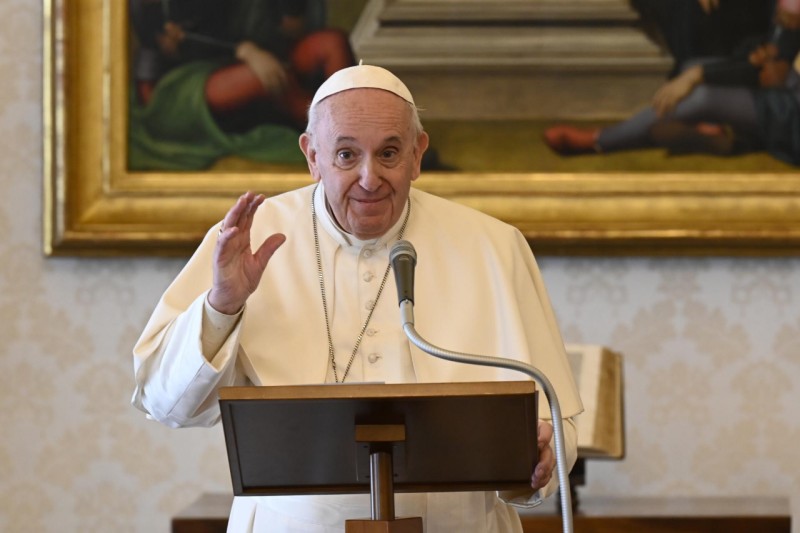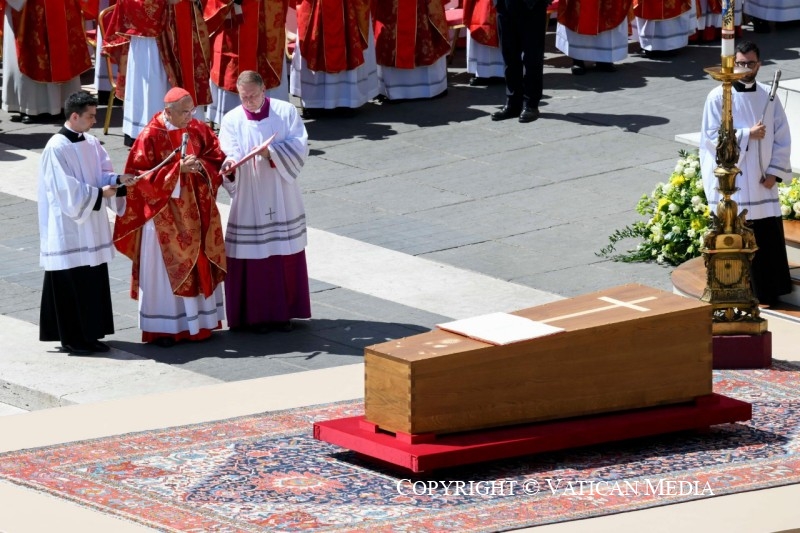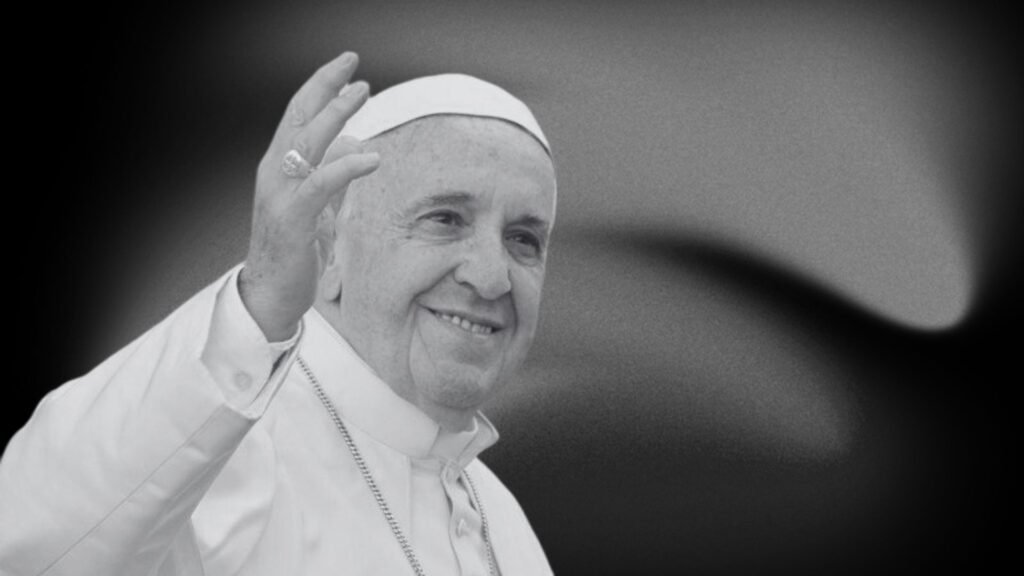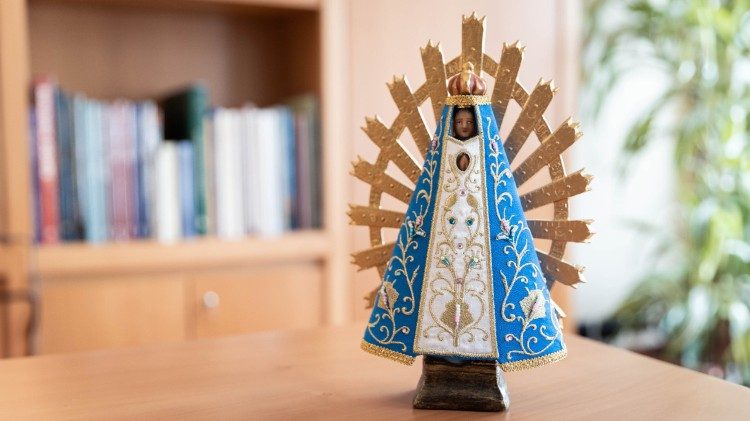Full Text: Pope’s March 21 Angelus Address
'The Cross Cannot but Express Love, Service, Unreserved Self-Giving'

Below is the full text of Pope Francis’ March 21, 2021, Angelus Address, presented from the Library of the Apostolic Palace in the Vatican. Pandemic restrictions prevented the faithful from gathering in St. Peter’s Square; however, the Pope’s words were broadcast worldwide via social media.
The Holy Father reminded the faithful that when someone asks to see Jesus today, the image of the crucifix is what first comes to mind:
“The important thing is that the sign be consistent with the Gospel: the cross cannot but express love, service, unreserved self-giving: only in this way is it truly the “tree of life”, of overabundant life.”
******
Dear Brothers and Sisters,
Buongiorno!
On this Fifth Sunday of Lent, the liturgy proclaims the Gospel in which Saint John refers to an episode that occurred in the final days of Christ’s life, shortly before the Passion (cf. Jn 12:20-33). While Jesus was in Jerusalem for the feast of Passover, several Greeks, curious because of what he had been doing, express the wish to see him. They approach the apostle Philip and say to him: “We wish to see Jesus” (v. 21). “We wish to see Jesus”. Let us remember this: “We wish to see Jesus”. Philip tells Andrew and then together they report it to the Teacher. In the request of those Greeks, we can glimpse the request that many men and women, of every place and every time, pose to the Church and also to each one of us: “We wish to see Jesus”.
And how does Jesus respond to that request? In a way that makes us think. He says: “The hour has come for the Son of Man to be glorified…. Unless a grain of wheat falls into the earth and dies, it remains just a single grain; but if it dies, it bears much fruit” (vv. 23-24). These words do not seem to respond to the request those Greeks made. In reality, they surpass it. In fact, Jesus reveals that for every man and woman who wants to find him, He is the hidden seed ready to die in order to bear much fruit. As if to say: if you wish to know me, if you wish to understand me, look at the grain of wheat that dies in soil, that is, look at the cross.
The sign of the Cross comes to mind, which over the centuries has become the symbol par excellence of Christians. Even today, those who wish to “see Jesus”, perhaps coming from countries and cultures where Christianity is not well-known, what do they see first? What is the most common sign they encounter? The Crucifix, the Cross. In churches, in the homes of Christians, even worn on their persons. The important thing is that the sign be consistent with the Gospel: the cross cannot but express love, service, unreserved self-giving: only in this way is it truly the “tree of life”, of overabundant life.
Today too, many people, often without saying so, implicitly would like to “see Jesus”, to meet him, to know him. This is how we understand the great responsibility we Christians and of our communities have. We too must respond with the witness of a life that is given in service, a life that takes upon itself the style of God – closeness, compassion, and tenderness – and is given in service. It means sowing seeds of love, not with fleeting words but through concrete, simple and courageous examples, not with theoretical condemnations, but with gestures of love. Then the Lord, with His grace, makes us bear fruit, even when the soil is dry due to misunderstandings, difficulty or persecution, or claims of legalism or clerical moralism. This is barren soil. Precisely then, in trials and in solitude, while the seed is dying, that is the moment in which life blossoms, to bear ripe fruit in due time. It is in this intertwining of death and life that we can experience the joy and true fruitfulness of love, which always, I repeat, is given in God’s style: closeness, compassion, tenderness.
May the Virgin Mary help us to follow Jesus, to walk, strong and joyful, on the path of service, so that the love of Christ may shine in our every attitude and become more and more the style of our daily life.
After the Angelus the Holy Father continued:
Dear brothers and sisters, today in Italy we celebrate the Day of remembrance and commitment in memory of the innocent victims of the mafia. The mafia are present in various parts of the world and, exploiting the pandemic, they are enriching themselves through corruption. Saint John Paul II denounced their “culture of death”, and Benedict XVI condemned them as “ways of death”. These structures of sin, mafia structures, contrary to Christ’s Gospel, exchange faith with idolatry. Today let us remember all the victims and let us renew our commitment against the mafia.
Tomorrow is World Water Day, which invites us to reflect on the value of this wonderful and irreplaceable gift of God. For us believers, “sister water” is not merchandise: it is a universal symbol and is the source of life and health. Too many brothers and sisters, so very many brothers and sisters have access to too little and perhaps polluted water. It is necessary to assure potable water and hygienic services to all. I thank and encourage those who, with diverse professionalism and responsibilities, work for this very important aim. I think, for example, of the University of Water, in my homeland, of those who work to bring it forward and to make the importance of water understood. Many thanks to you Argentinians who work in this University of Water.
I greet all of you who are linked via the media, with a particular remembrance of sick and lonely people. I wish you a happy Sunday. Please, do not forget to pray for me. Enjoy your lunch! Arrivederci!
© Libreria Editrice Vatican
Related

Mercy and the joy of the Gospel are two key concepts of Pope Francis
Exaudi Staff
26 April, 2025
9 min

Thousands of faithful bid farewell to Pope Francis in St. Peter’s Square
Exaudi Staff
26 April, 2025
2 min

Saying Goodbye to Francis
Exaudi Staff
26 April, 2025
2 min

Pope Francis Gifts a Statue of Our Lady of Luján to Gemelli and the Catholic University of the Sacred Heart
Exaudi Staff
25 April, 2025
2 min
 (EN)
(EN)
 (ES)
(ES)
 (IT)
(IT)

